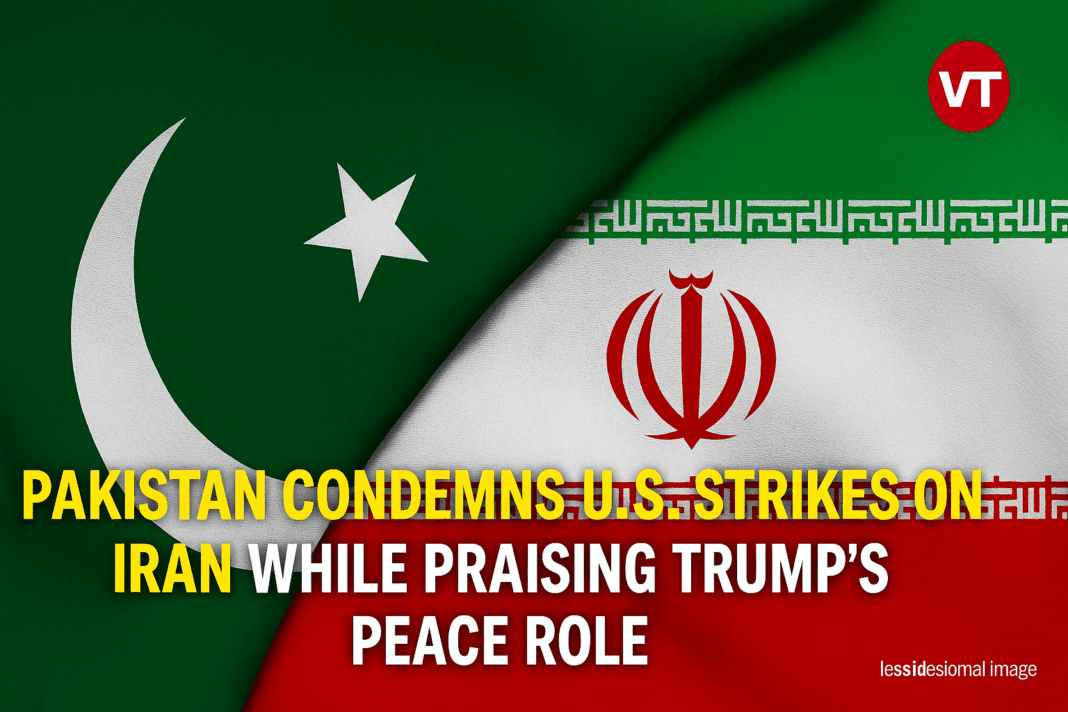Lead:
Pakistan has condemned the U.S. airstrikes on Iranian nuclear facilities as a violation of international law, even as it continues to praise President Trump for his recent mediation between India and Pakistan. The diplomatic balancing act underscores Islamabad’s evolving regional posture.
Why it matters:
Pakistan’s condemnation of its close military partner, the U.S., places it in diplomatic alignment with Iran, China, and Russia—while simultaneously maintaining praise for President Trump’s regional peace role. The move highlights Islamabad’s shifting foreign policy calculus amid escalating Middle East tensions.
State of play:
- In a statement released on June 22, Pakistan’s Ministry of Foreign Affairs denounced the U.S. strikes as “violating all norms of international law.”
- The statement reiterated Iran’s “legitimate right to defend itself under the UN Charter” and warned of “severely damaging implications” if hostilities continue.
- Pakistan urged respect for civilian lives, adherence to international humanitarian law, and a return to diplomacy in line with the UN Charter.
- The condemnation comes just one day after Pakistan formally nominated President Trump for the 2026 Nobel Peace Prize for mediating the May 10 India-Pakistan ceasefire.

Official statement released by Pakistan’s Ministry of Foreign Affairs on June 22, 2025
Driving the news:
On June 21, U.S. forces—reportedly coordinating with Israel—launched strikes against Iran’s nuclear sites at Fordow, Natanz, and Esfahan. President Trump hailed the operation as a “spectacular military success,” claiming it had crippled Iran’s nuclear enrichment capabilities.
>Flashback:
President Trump played a key role in mediating a ceasefire between India and Pakistan following an escalation in Kashmir. On June 21, Pakistan submitted his Nobel Peace Prize nomination, citing his role in preventing a broader military conflict.
Between the lines:
Islamabad’s dual stance—commending Trump’s diplomacy while criticizing U.S. military actions—illustrates its attempt to assert strategic autonomy while managing long-standing regional alliances.
International reactions:
- Iran: Welcomed Pakistan’s condemnation. President Pezeshkian personally thanked PM Shehbaz Sharif in a call on June 22.
- China: Backed Pakistan’s position, denouncing the U.S. strike as a “serious violation of international law.”
- Russia: Condemned the U.S. at the UN Security Council and held direct talks with Iran’s foreign minister in Moscow.
- Argentina: President Javier Milei praised the U.S. and Israel for “fighting terrorism.”
- Japan: Urged de-escalation, emphasizing diplomacy without endorsing or condemning either side.
- Vatican: Pope Leo XIV appealed for peace during his June 22 Angelus, calling the situation in Iran “alarming.”
- UK: Urged restraint but avoided direct comment on Pakistan’s condemnation during PM Starmer’s call with Trump.
- India: Did not address Pakistan’s statement but warned against instability in the Strait of Hormuz.
- UN: Scheduled an emergency Security Council meeting after Iran’s ambassador submitted a formal complaint.
Domestic reactions in Pakistan:
- Opposition (PTI): Condemned U.S. strikes and criticized the Nobel nomination, calling it “contradictory.”
- Public Sentiment: Protests erupted in Karachi, with demonstrators burning U.S. flags and denouncing Trump.
- Social Media: Unverified claims circulated that Pakistan allowed U.S. planes to use its airspace—fueling public debate, though no official evidence supports this.
What they’re saying:
“These attacks violate all norms of international law and Iran has the legitimate right to defend itself under the UN Charter.” — Pakistan Ministry of Foreign Affairs
“We urge all parties to respect civilian lives and resolve the conflict through dialogue and diplomacy.” — Official statement, June 22
Analysis:
Pakistan’s condemnation aligns it with Iran and major Eastern powers like China and Russia. Yet it remains diplomatically tethered to Washington following Trump’s mediation efforts. Islamabad now walks a tightrope—balancing regional loyalties, domestic sentiment, and strategic ties with the West.
What’s next:
The UN Security Council is expected to discuss the legality and fallout of the U.S. strikes. Meanwhile, Pakistan’s dual positioning may come under further scrutiny as regional powers push for firmer alignment amid rising Middle East tensions.

